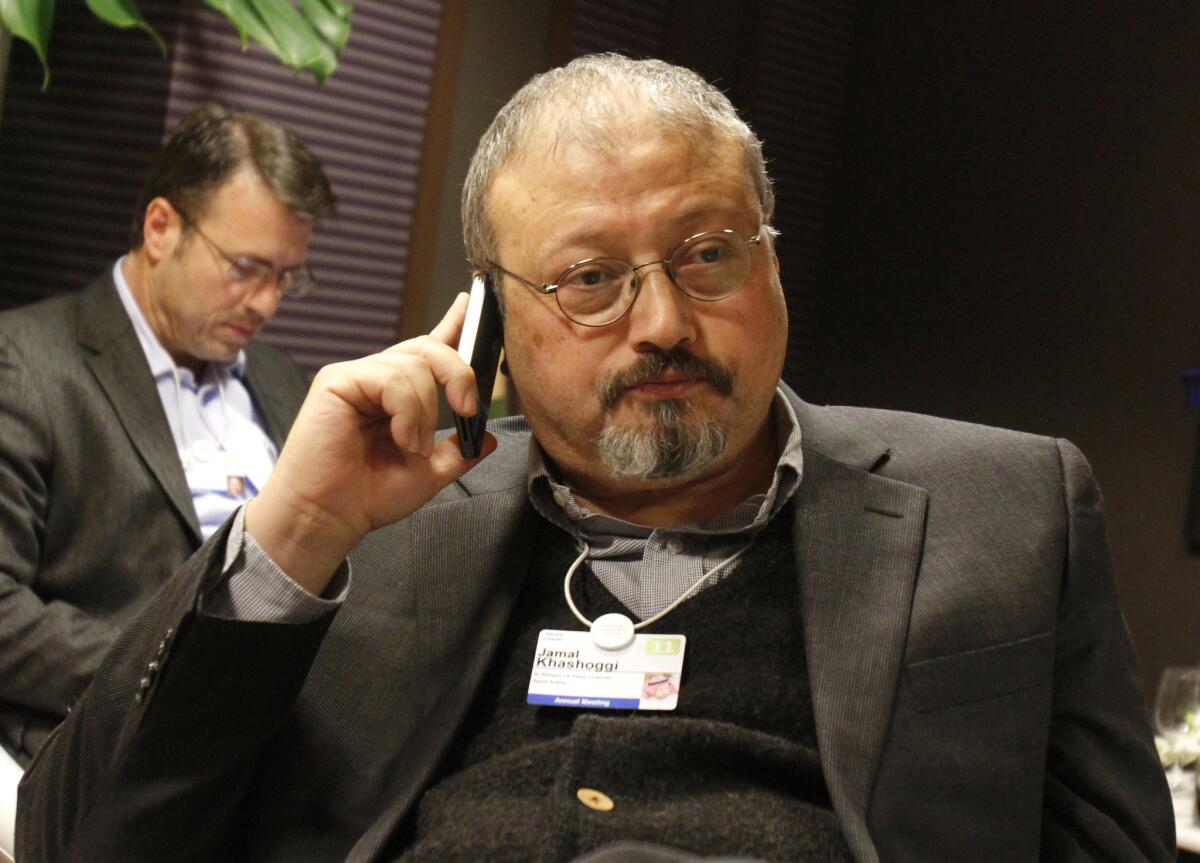Op-Ed: It’s been 2 years since Khashoggi’s killing. Why is Trump still enabling the Saudi regime?

Two years have passed since the grisly murder and dismemberment of Jamal Khashoggi, the Washington Post journalist and Saudi dissident, at the Saudi Consulate in Istanbul.
It is widely believed that Saudi Crown Prince Mohammed bin Salman ordered Khashoggi’s killing. Both the CIA and the United Nations have concluded as much. Prince Salman himself acknowledged that the murder took place, as he put it, “under my watch.”
Yet the United States continues to sell weapons to Saudi Arabia, supplying Prince Salman’s regime not only with the means to continue pursuing violence at home and abroad, most notably in Yemen, but also with an implicit endorsement of its autocratic agenda.
President Trump and members of his administration have argued that arms sales are necessary for a host of reasons — to create jobs in the U.S., to maintain influence within Saudi Arabia, and to further America’s national security interests in the Middle East. There is little evidence that such deals are accomplishing any of these objectives.
Rather, American weapons have helped to shield Prince Salman from the consequences of his actions, enabling policies that jeopardize the security of both the U.S. and Saudi Arabia. The claims that arms deals would lead to significant jobs for Americans were also found to be greatly exaggerated.
The crown prince has not yet ascended the throne of his father, King Salman, but as the kingdom’s de facto ruler, his efforts to consolidate power and crush dissent have been brutal. He has jailed and extorted family members and potential rivals. He has prosecuted and jailed political activists and human rights advocates, even as he touts his own ostensibly liberal reforms. More than a year before the killing of Khashoggi, he authorized the capture and torture of Saudi dissidents abroad. One former Saudi intelligence official alleged that the prince sent a team to Canada to kill him.
Saudi Arabia’s war in Yemen, begun at the urging of Prince Salman, is an utter disaster — for Yemeni civilians, of course, but also for the kingdom. Thousands of civilians have been killed in airstrikes by the Saudi-led coalition, and many more have perished in the broader humanitarian crisis engulfing the country. The onslaught is made possible by American weapons. Across Yemen, fragments of arms supplied by American companies can be found in the remnants of bombed-out schools, hospitals and factories — enduring testaments to America’s complicity in Saudi Arabia’s war crimes.
Riyadh and Washington have little to show for the bloodshed. Iran-backed Houthi insurgents remain firmly in control of Yemen’s capital, Sanaa, along with much of the country’s north. They are poised to push coalition forces out of key encampments in Marib province. In the south, nominal Saudi allies have splintered, providing another axis of violence in an already bloody civil war and creating fertile ground for transnational militancy.
The Obama administration also sold tens of billions in arms to Saudi Arabia, many of which are still being used in Yemen. But the administration pulled back during Obama’s second term, suspending a sale of precision-guided munitions over concerns about civilian casualties.
The Trump administration reversed the ban on guided bombs and has gone full steam ahead ever since. Trump and Secretary of State Michael R. Pompeo have claimed that arms sales to Riyadh are justified by a looming threat from Iran. But this, too, rings hollow. The continued militarization of the Persian Gulf only exacerbates tensions and creates new theaters of war for Tehran.
American lawmakers have grown wise to the damage caused by arms sales to Saudi Arabia. After Khashoggi’s killing, Democrats and Republicans joined forces to block such deals. Nevertheless, last year, Trump bypassed congressional oversight to sell arms to Saudi Arabia and other members of the kingdom’s coalition fighting in Yemen. The episode exposed loopholes in the congressional review process for such deals, but it also roused further opposition to America’s role in Riyadh’s military interventions.
The U.S. needs to terminate all weapons transfers and military aid to Saudi Arabia. Although congressional efforts to suspend arms transfers to Riyadh have failed in the past, it should remain a priority for American lawmakers. A moratorium on arms sales would not in and of itself stop the war in Yemen or Prince Salman’s repressive tactics, but it would send a clear message that the U.S. will no longer give a blank check to the Saudi regime.
As Riyadh spends billions fueling conflicts, exporting violence and silencing dissidents, Americans of every political stripe are rightfully questioning the wisdom of the alliance. But in the years since Khashoggi’s killing, American policymakers have been unable to press the Saudi regime to stop killing civilians in Yemen or negotiate an end to the war. Halting arms sales would be the first step in a much-needed course correction.
William Hartung is the director of the arms and security program at the Center for International Policy and the author of a new report, “The Mideast Arms Bazaar: Top Arms Suppliers to the Middle East and North Africa, 2015-2019.” Elias Yousif is the acting director of the security assistance monitor at the Center for International Policy and the author of a new report, “Beyond Performance: Lessons Learned from U.S. Security Assistance to Tunisia.”
More to Read
A cure for the common opinion
Get thought-provoking perspectives with our weekly newsletter.
You may occasionally receive promotional content from the Los Angeles Times.










